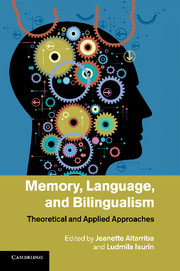Book contents
- Memory, Language, and Bilingualism
- Memory, Language, and Bilingualism
- Copyright page
- Contents
- Figures
- Tables
- Contributors
- Introduction
- 1 Bilingual memory:
- 2 Lexical competition in localist and distributed connectionist models of L2 acquisition
- 3 Working memory and (second) language processing
- 4 Working memory in simultaneous interpreters
- 5 Using electrophysiological measures to track the mapping of words to concepts in the bilingual brain:
- 6 Age effects in L2 learning:
- 7 Bilingualism, language, and aging
- 8 Crossovers and codeswitching in the investigation of immigrant autobiographical memory
- 9 Linguistic relativity and bilingualism
- 10 Testing effects for novel word learning in Chinese–English bilinguals
- 11 The lexicon in second language attrition:
- 12 Memory and first language forgetting
- 13 Future research directions:
- Index
4 - Working memory in simultaneous interpreters
Published online by Cambridge University Press: 05 November 2012
- Memory, Language, and Bilingualism
- Memory, Language, and Bilingualism
- Copyright page
- Contents
- Figures
- Tables
- Contributors
- Introduction
- 1 Bilingual memory:
- 2 Lexical competition in localist and distributed connectionist models of L2 acquisition
- 3 Working memory and (second) language processing
- 4 Working memory in simultaneous interpreters
- 5 Using electrophysiological measures to track the mapping of words to concepts in the bilingual brain:
- 6 Age effects in L2 learning:
- 7 Bilingualism, language, and aging
- 8 Crossovers and codeswitching in the investigation of immigrant autobiographical memory
- 9 Linguistic relativity and bilingualism
- 10 Testing effects for novel word learning in Chinese–English bilinguals
- 11 The lexicon in second language attrition:
- 12 Memory and first language forgetting
- 13 Future research directions:
- Index
Summary
Simultaneous interpretation – the continuous, immediate, oral translation from one language to another – permits researchers to consider bilingual processing in real-life professional situations. The task is physically and cognitively demanding, taking years to master. Most professional interpreters receive considerable graduate-level training following a rigorous selection process which requires expertise in three or more languages and skills in a range of other cognitive abilities. Working memory – the ability to store and process incoming information verbatim for a brief period – has been posited as a cognitive skill heavily called upon throughout the simultaneous interpretation process. Since the brain’s structure and function are influenced by experience, and working memory is considered crucial to interpretation, it has been postulated that simultaneous interpreters may have better working memory skills than non-interpreters. The evidence in the literature has been contradictory, however. A number of studies indicate superior working memory for interpreters relative to non-interpreters, while others do not. This chapter weighs the data in support of working memory advantages for interpreters against that suggesting no difference between the two groups, concluding that the strength of the arguments favors greater working memory skills in interpreters.
- Type
- Chapter
- Information
- Memory, Language, and BilingualismTheoretical and Applied Approaches, pp. 95 - 125Publisher: Cambridge University PressPrint publication year: 2012
- 2
- Cited by



